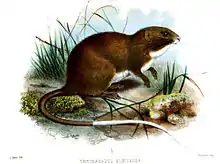Olallamys
Olallamys is a genus of Andean soft-furred spiny rat that range from Panama through Colombia and Venezuela to northern Ecuador.[1] These species are typically found at elevations above 2,000 metres (6,600 ft).[2]
| Olallamys Temporal range: | |
|---|---|
 | |
| White-tailed olalla rat, Olallamys albicauda | |
| Scientific classification | |
| Domain: | Eukaryota |
| Kingdom: | Animalia |
| Phylum: | Chordata |
| Class: | Mammalia |
| Order: | Rodentia |
| Family: | Echimyidae |
| Subfamily: | Echimyinae |
| Tribe: | Echimyini |
| Genus: | Olallamys Emmons, 1988 |
| Type species | |
| Thrinacodus albicauda | |
| Species | |
Systematics
Olallamys is a taxonomic patronym honoring the Ecuadorian birds and mammals collector Carlos Olalla.[3]
The genus Olallamys contains two species:
- Olallamys albicauda (White-tailed olalla rat)
- Olallamys edax (Greedy olalla rat)
Phylogeny
Olallamys is a member of the Echimyini clade of arboreal Echimyidae rodents. The closest relative of Olallamys is Dactylomys, and then Kannabateomys. These South American bamboo rats share unique features and are grouped under the informal clade name of "Dactylomyines".[4] The dactylomyines are the sister genera to Diplomys and Santamartamys. All these taxa are closely related to the genera Echimys, Phyllomys, Makalata, Pattonomys, and Toromys. In turn, these genera share phylogenetic affinities with the clade containing Lonchothrix and Mesomys, and with Isothrix.[5]
| Genus-level cladogram of the Echimyini. | |||||||||||||||||||||||||||||||||||||||||||||||||||||||||||||||||||||||||||
| |||||||||||||||||||||||||||||||||||||||||||||||||||||||||||||||||||||||||||
| The cladogram has been reconstructed from mitochondrial and nuclear DNA characters.[6][7][8][9][10][11][12][13][5] |
References
- Woods, C.A.; Kilpatrick, C.W. (2005). "Genus Olallamys". In Wilson, D.E.; Reeder, D.M (eds.). Mammal Species of the World: A Taxonomic and Geographic Reference (3rd ed.). Johns Hopkins University Press. p. 1576. ISBN 978-0-8018-8221-0. OCLC 62265494.
- Eisenberg, J. F.; Redford, K. H. (15 May 2000). Mammals of the Neotropics, Volume 3: The Central Neotropics: Ecuador, Peru, Bolivia, Brazil. University of Chicago Press. p. 483. ISBN 978-0-226-19542-1. OCLC 493329394.
- Emmons, L. H. (20 May 1988). "Replacement Name for a Genus of South American Rodent (Echimyidae)". Journal of Mammalogy. 69 (2): 421. doi:10.2307/1381405. ISSN 0022-2372. JSTOR 1381405.
- Fabre, Pierre-Henri; Patton, James L.; Leite, Yuri L. R. (2016). "Family Echimyidae (hutias, South American spiny-rats and coypu)". In Wilson, Don E.; Lacher, Thomas E. Jr; Mittermeier, Russell A. (eds.). Handbook of the Mammals of the World. Vol 6. Lagomorphs and Rodents I. Barcelona: Lynx Edicions. pp. 552–641. ISBN 978-84-941892-3-4.
- Fabre, Pierre-Henri; Upham, Nathan S.; Emmons, Louise H.; Justy, Fabienne; Leite, Yuri L. R.; Loss, Ana Carolina; Orlando, Ludovic; Tilak, Marie-Ka; Patterson, Bruce D.; Douzery, Emmanuel J. P. (1 March 2017). "Mitogenomic Phylogeny, Diversification, and Biogeography of South American Spiny Rats". Molecular Biology and Evolution. 34 (3): 613–633. doi:10.1093/molbev/msw261. ISSN 0737-4038. PMID 28025278.
- Lara, Márcia C.; Patton, James L.; da Silva, Maria Nazareth F. (1996). "The Simultaneous Diversification of South American Echimyid Rodents (Hystricognathi) Based on Complete Cytochrome b Sequences". Molecular Phylogenetics and Evolution. 5 (2): 403–413. doi:10.1006/mpev.1996.0035. PMID 8728398.
- Leite, Yuri L. R.; Patton, James L. (2002). "Evolution of South American spiny rats (Rodentia, Echimyidae): the star-phylogeny hypothesis revisited". Molecular Phylogenetics and Evolution. 25 (3): 455–464. doi:10.1016/s1055-7903(02)00279-8. PMID 12450750.
- Galewski, Thomas; Mauffrey, Jean-François; Leite, Yuri L. R.; Patton, James L.; Douzery, Emmanuel J. P. (2005). "Ecomorphological diversification among South American spiny rats (Rodentia; Echimyidae): a phylogenetic and chronological approach". Molecular Phylogenetics and Evolution. 34 (3): 601–615. doi:10.1016/j.ympev.2004.11.015. PMID 15683932.
- Upham, Nathan S.; Patterson, Bruce D. (2012). "Diversification and biogeography of the Neotropical caviomorph lineage Octodontoidea (Rodentia: Hystricognathi)". Molecular Phylogenetics and Evolution. 63 (2): 417–429. doi:10.1016/j.ympev.2012.01.020. PMID 22327013.
- Fabre, Pierre-Henri; Galewski, Thomas; Tilak, Marie-ka; Douzery, Emmanuel J. P. (1 March 2013). "Diversification of South American spiny rats (Echimyidae): a multigene phylogenetic approach". Zoologica Scripta. 42 (2): 117–134. doi:10.1111/j.1463-6409.2012.00572.x. ISSN 1463-6409. S2CID 83639441.
- Loss, Ana; Moura, Raquel T.; Leite, Yuri L. R. (2014). "Unexpected phylogenetic relationships of the painted tree rat Callistomys pictus (Rodentia: Echimyidae)" (PDF). Natureza on Line. 12: 132–136.
- Fabre, Pierre-Henri; Vilstrup, Julia T.; Raghavan, Maanasa; Der Sarkissian, Clio; Willerslev, Eske; Douzery, Emmanuel J. P.; Orlando, Ludovic (1 July 2014). "Rodents of the Caribbean: origin and diversification of hutias unravelled by next-generation museomics". Biology Letters. 10 (7): 20140266. doi:10.1098/rsbl.2014.0266. ISSN 1744-9561. PMC 4126619. PMID 25115033.
- Upham, Nathan S.; Patterson, Bruce D. (2015). "Evolution of Caviomorph rodents: a complete phylogeny and timetree for living genera". In Vassallo, Aldo Ivan; Antenucci, Daniel (eds.). Biology of caviomorph rodents: diversity and evolution. Buenos Aires: SAREM Series A, Mammalogical Research – Sociedad Argentina para el Estudio de los Mamíferos. pp. 63–120.